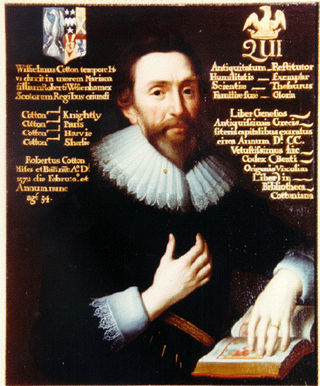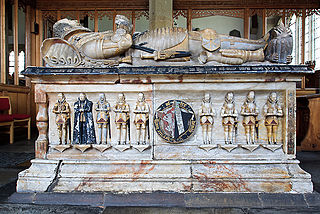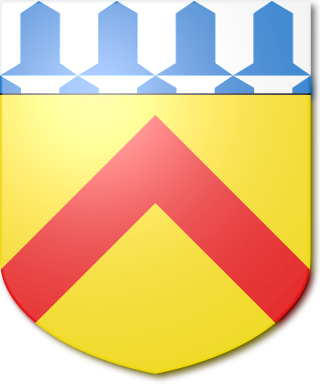
Earl of Winchilsea is a title in the Peerage of England. It has been held by the Finch-Hatton family of Kent, and united with the title of Earl of Nottingham under a single holder since 1729.

Earl of Egmont was a title in the Peerage of Ireland, created in 1733 for John Perceval, 1st Viscount Perceval. It became extinct with the death of the twelfth earl in 2011.

There have been three Baronetcies created for persons with the surname Cotton, all in the Baronetage of England. One creation is extant as of 2008.
There have been ten baronetcies created for persons with the surname Browne, six in the Baronetage of Great Britain, three in the Baronetage of Ireland and one in the Baronetage of Nova Scotia. Only one creation is extant as of 2010. Three of the creations were for members of the Browne family headed by the Viscount Montagu.

Viscount Hewett was a title in the Peerage of Ireland. It was created on 9 April 1689 for Sir George Hewett, 2nd Baronet. He was made Baron of Jamestown at the same time, also in the Peerage of Ireland. The Hewett Baronetcy, of Pishiobury in the County of Hertford, was created in the Baronetage of England on 19 July 1660 for Thomas Hewett, Member of Parliament for Windsor. Both titles became extinct on the first Viscount's death in 1689.

There have been seven Baronetcies created for persons with the surname Lewis, two in the Baronetage of England and five in the Baronetage of the United Kingdom. Only one creation is extant as of 2010.

There have been two baronetcies created for persons with the surname Alston, both in the Baronetage of England. Both creations are extinct.
There have been nine baronetcies created for persons with the surname Lloyd, three in the Baronetage of England, three in the Baronetage of Great Britain and three in the Baronetage of the United Kingdom. Two of the creations are extant as of 2010.

There have been twenty one baronetcies created for persons with the surname Williams, eight in the Baronetage of England, three in the Baronetage of Great Britain and ten in the Baronetage of the United Kingdom. Only six of the creations are extant as of 2017.

There have been four baronetcies created for persons with the surname Hope, three in the Baronetage of Nova Scotia and one in the Baronetage of the United Kingdom. As of 2010 one creation is extant, one dormant and two extinct.
There have been seven baronetcies created for persons with the surname Powell, five in the Baronetage of England and two in the Baronetage of the United Kingdom. Only one creation is extant as of 2007.

There have been two baronetcies created for members of the Salusbury family, the first in the Baronetage of England and the second in the Baronetage of Great Britain. Neither title has survived to the present day although the senior baronetcy is technically considered to be dormant.

The Baronetcy of Gresley of Drakelow was created in the Baronetage of England on 29 June 1611 for George Gresley of Drakelow Hall, Derbyshire who was later High Sheriff of Derbyshire and Member of Parliament for Newcastle-under-Lyme.
There have been two baronetcies created for persons with the surname Mackworth, one in the Baronetage of England and one in the Baronetage of Great Britain. One creation is extant as of 2008.

There have been four baronetcies created for members of the ancient House of Beaumont, all in the Baronetage of England. All four creations are extinct or dormant.
The Mauleverer Baronetcy, of Allerton in the County of York, was a title in the Baronetage of England. It was created on 4 August 1641 for Thomas Mauleverer, Member of Parliament for Boroughbridge. The second and third Baronets also represented this constituency in the House of Commons. The title became extinct on the death of the fifth Baronet in 1713.

The St Quintin Baronetcy, of Harpham in the County of York, was a title in the baronetage of England. It was created on 8 March 1642 for William St Quintin. The third Baronet sat as Member of Parliament for Kingston upon Hull. The fourth Baronet was Member of Parliament for Thirsk. The title became extinct on the death of the fifth Baronet in 1795. The family estate of Scampston Hall was passed on to the late Baronet's nephew, William Thomas Darby, the son of Vice-Admiral George Darby, who assumed the surname and arms of St Quintin.

There have been seven baronetcies created for persons with the surname Herbert, three in the Baronetage of England, one in the Baronetage of Ireland and three in the Baronetage of the United Kingdom. All creations are extinct.
The Wolstenholme Baronetcy, of London, was a title in the Baronetage of England. It was created on 10 January 1665 for John Wolstenholme, who had previously represented West Looe, Newport and Queenborough in Parliament. He had been heavily fined by the Parliamentarians for supporting the Royal cause during the Civil War. The third Baronet sat as Member of Parliament for Middlesex. The title became extinct on the death of the seventh Baronet in 1762.
Sir Herbert Price, 1st Baronet was a Welsh politician who sat in the House of Commons at various times between 1640 and 1678. He fought on the Royalist side in the English Civil War.